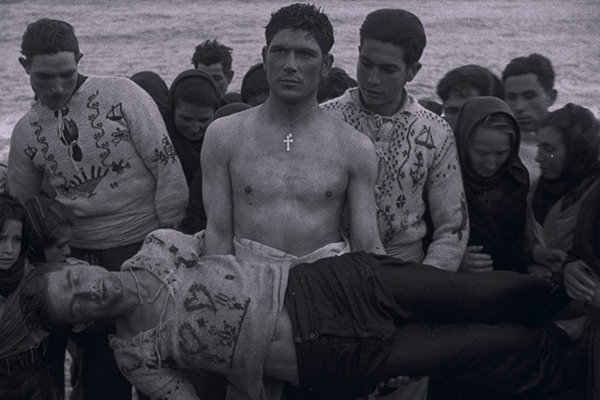Ala-Arriba!
de José Leitão de Barros , Portugal , 1942
A film by José Leitão de Barros, Ala-Arriba! is his second venture into visual anthropology and the final installment of his trilogy about the sea. It marks his first docufiction, and the second in cinema history, following Robert Flaherty’s Moana (1926), which was also the first ethnofiction.
The title, Ala-Arriba!, is a traditional expression from the northern coastal town of Póvoa de Varzim meaning “heave-ho!”, a communal cry used when locals hauled their boats ashore by hand. Played mostly by non-professional actors, the film tells the story of a sardine fisherman from Póvoa who falls in love with a young woman. Their romance is shaped by social divisions and the hardships caused by the scarcity of fish. Deeply rooted in local culture, the film vividly portrays traditional customs, with the sea playing a central, almost mythical role.
Ala-Arriba! was the first Portuguese film to receive an international award: the Volpi Cup at the 1942 Venice Film Festival, recognized for its dramatic intensity and striking visual style, inspired by the work of Rino Lupo. It remains an undisputed masterpiece of classic Portuguese cinema.

Ala-Arriba !
Directed by José Leitão de Barros
Screenplay by Alfredo Cortez (co-writer)
Music by Ruy Coehlo
Running time: 90 minutes
Country of production: Portugal
Year of production: 1942
Theatrical release: September 15, 1942
Information about available material
Medium / Format designated for restoration: DCP
Condition: Restored
Place of preservation: Cinemateca Portuguesa - Museu do Cinema
Negotiations underway with a partner: Application submitted to the CNC for selective digitization assistance
The new digital copy results from a 4K scan, using liquid gate immersion, of the original 35mm camera negative, material preserved by Cinemateca Portuguesa – Museu do Cinema. The sound was digitized from the optical track of a 35mm sync print, also held by Cinemateca Portuguesa.
The scanning, digital image restoration, and color correction were carried out as part of a partnership between Cineric Portugal and Irmã Lúcia Special Effects, and the digital sound restoration was done by BillyBoom Studios in 2024, using a distribution print as reference.
This digitization project was coordinated by Cinemateca Portuguesa - Museu do Cinema, under the frame of the FILMar project, part of the European Financial Mechanism EEA Grants 2020-2024.
Information on film rights and desired prospects
Film representative: Rui Machado (Cinemateca Portuguesa – Museu do Cinema)
Rights holders: Joana de Sousa (Cinemateca Portuguesa – Museu do Cinema)
Available rights: All rights are available




